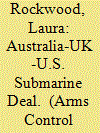| Srl | Item |
| 1 |
ID:
183352


|
|
|
|
|
| Summary/Abstract |
If the AUKUS deal, under which the United States and the United Kingdom agreed to sell nuclear-powered submarines to Australia, goes forward, it will have a precedent-setting effect on the International Atomic Energy Agency (IAEA) safeguards implemented pursuant to the nuclear Nonproliferation Treaty (NPT), which is formally known as the Treaty on the Non-Proliferation of Nuclear Weapons.
|
|
|
|
|
|
|
|
|
|
|
|
|
|
|
|
| 2 |
ID:
183350


|
|
|
|
|
| Summary/Abstract |
Europe remains deeply divided over the Treaty on the Prohibition of Nuclear Weapons (TPNW), with NATO membership the main political fault line between treaty critics and sympathizers. Since 2010, NATO has described itself as a nuclear alliance. In December 2020, all 30 of its members collectively stated their opposition to the ban treaty, but that appearance of unity is vanishing as the treaty picks up support in key allied nations.
|
|
|
|
|
|
|
|
|
|
|
|
|
|
|
|
| 3 |
ID:
183351


|
|
|
|
|
| Summary/Abstract |
More states than ever have cruise and ballistic missiles in their arsenals. In 1987, for instance, only three states—the United Kingdom, the United States, and the Soviet Union—possessed cruise missiles. Twenty-three states and one nonstate actor possess them today. The demand for these systems is partly driven by their increasing utility, resulting from exponential improvements in survivability, accuracy, and speed. Missile proliferation has been accelerated by the spread of enabling technologies that have allowed more actors to overcome previous structural hurdles.
|
|
|
|
|
|
|
|
|
|
|
|
|
|
|
|
| 4 |
ID:
183349


|
|
|
|
|
| Summary/Abstract |
Last month, the UN General Assembly First Committee, responsible for international security, approved a compromise resolution that sets into motion a new open-ended working group to develop rules of the road for military activities in space. If key countries, including the United States, provide leadership, the initiative could help advance progress toward legally binding measures designed to prohibit counterspace activities that threaten international security, beginning with a ban on land-based anti-satellite (ASAT) weapons.
|
|
|
|
|
|
|
|
|
|
|
|
|
|
|
|